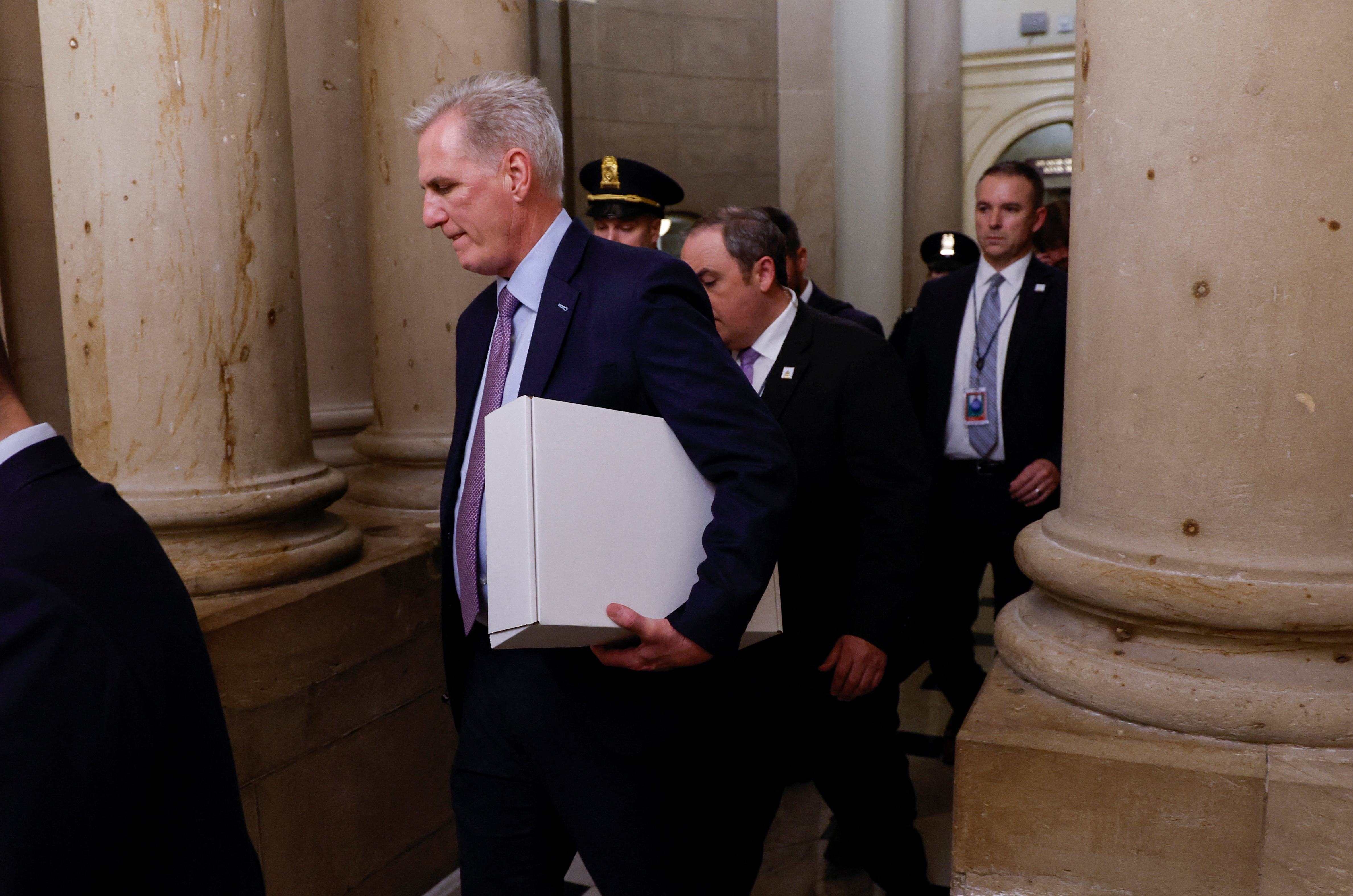On Wednesday, December 6th, four Republican hopefuls sparred in the fourth GOP debate. The Republican front-runner, former president Donald Trump, chose to skip the debate and instead attend a fundraiser in Florida. Against the backdrop of an unusual presidential election, former House Speaker, Kevin McCarthy announced his resignation just days after the House of Representatives voted to expel embattled congressman, George Santos. Today’s turbulent political climate presents unparalleled circumstances for the 2024 elections.
Lay of the Land
The four candidates who shared the stage, Ron DeSantis, Nikki Haley, Vivek Ramaswamy, and Chris Christie, collectively comprise one of the most varied groups of participants in a Republican primary debate. Before the debate, Ron DeSantis, the current governor of Florida, maintained a marginal lead over the other candidates on the stage. In recent weeks, former South Carolina Governor, Nikki Haley, has risen in the polls, trailing Governor DeSantis by only one point. Vivek Ramaswamy, who experienced a surge in popularity during the summer, remains far behind while former New Jersey Governor, Chris Christie, barely registers in the polls. All four candidates poll significantly below the Republican frontrunner, Donald Trump.
Haley Singled Out

During the debate, Haley, who has the greatest momentum, received the greatest criticism. The first attack came from biotech entrepreneur Vivek Ramaswamy who accused Haley of corruption. At one point, Ramaswamy held a sign stating “Nikki = Corrupt.” Ramaswamy also criticized Haley’s dependence on Wall Street donors and her membership on the board of the Boeing Corporation. Meanwhile, DeSantis accused Haley of not supporting a ban on gender-affirming treatments for transgender adolescents. Furthermore, he tried to portray Haley as a member of the Republican establishment, distant from Trump. Haley defended herself against these attacks from Ramaswamy and Desantins, smiling and claiming that her opponents were just jealous of her rise in the polls.
Christie Stands Alone

Former Governor, Chris Christie, the least likely to win the Republican primaries, was the only candidate to criticize former president Donald Trump. Christie called Trump a “bitter man” who “wants to exact retribution on anyone who has disagreed with him [or] anyone who has tried to hold him to account.” Christie even referred to Trump as the evil wizard Voldemort, claiming that the former president has control over his opponents’ political speech. He later claimed that he is “in the race because the truth needs to be spoken.”
Christie’s scathing remarks come in contrast to the other candidates’ reserved critique of the former president. When asked about Trump, DeSantis argued that Trump would be too old to serve as President, falling short of critiquing his criminal history. During the same response, DeSantis defended Trump against the criticism he has faced from President Biden.
Christie and Ramaswamy Spar
When discussing the War in Ukraine, former governor Christie chastised Ramaswamy’s peace deal, which includes Ukraine ceding land to Russia. He claimed that the plan unreasonably placed trust in President Putin to maintain a peaceful relationship with Ukraine and not foster a deeper relationship with China. As the dispute between the two escalated, Christie called Ramaswamy “the most obnoxious blowhard in America.”
In a later discussion, Ramaswamy compared Haley’s intelligence to that of his toddler, claiming that she couldn’t name three Ukrainian provinces that “she wants our sons and daughters to die for.” Christie came to the former South Carolina Governor’s defense, calling out Ramaswamy for “insulting her.” Retaliating against Christie for his scathing criticism, Ramaswamy told him to “get the hell out of this race.” Ramaswamy also attacked Christie’s foreign policy expertise by claiming that “his only experience is closing a bridge between New Jersey and New York.”
The Republican Primary From Here
With less than 40 days until the Iowa Caucus and 50 days until the New Hampshire primary, this debate will make a lasting impression on Republican voters. A poll conducted by the Washington Post and Ipsos found that DeSantis performed the best, followed by Haley, Christie, and Ramaswamy. However, when it came to who gained support in the polls, only Christie had more potential support after the debate. Despite these slight changes in polling, the debate did little to change the projected outcome of the 2024 Republican primaries. Former President Trump still maintains a significant lead over the other candidates.
Santos Expulsion

Amidst the ongoing presidential campaign, the United States House of Representatives made history by expelling Republican Congressman George Santos. He joins a dishonorable group of 20 expelled congressmen, the only one to not be convicted of a crime or committing treason. Santos, a seemingly pathological liar, has been charged with conspiracy, wire fraud, false statements, falsification of records, identity theft, and credit card fraud. A scathing House Ethics Committee report unveiled the full extent of Santos’ fraudulent actions.
Santos’ Turbulent History
Santos’ bid for congress began in 2020 when he ran against now-former representative Tom Suozzi. He lost to the Democrat by over 12 points. The following year, Santos made an appearance at the Trump rally that preceded the January 6th insurrection. In June of 2021, Santos initiated his second bid for New York’s 3rd congressional district. On his campaign webpage, he falsely claimed to have graduated from Baruch College and had been employed by Goldman Sachs. Santos later disclosed his financial assets, claiming to be worth 11 million dollars, substantially above what he had reported in his 2020 campaign. After winning the 2022 midterm election for New York’s third congressional district, Santos attended the Republican Jewish Coalition Summit and claimed to be “a proud American Jew.”
Two days later, in a radio interview, Santos alleged that he lost four employees in the Orlando nightclub shooting. Meanwhile, Goldman Sachs and Baruch College verified that Santos had not been affiliated with their organizations. Reports also indicated that Santos was not of Jewish descent. Concurrently, the New York Attorney General’s Office launched an investigation into possible criminal activity. Soon after, the Nassau County District Attorney opened an investigation. In January of 2023, reports showed that Santos engaged in illegal campaign activity, using campaign funds for his personal purchases. Santos was also accused of having one of his staffers impersonate former speaker McCarthy’s chief of staff to raise campaign funds. The damning allegations lead four republican representatives to call for Santos’ resignation. Despite bipartisan calls for his resignation, Santos is promoted to the Small Business Committee and the Science, Space, and Technology Committee.
Lead Up to Expulsion
In March of this year, the House Ethics Committee voted to investigate Santos for his violation of federal conflict of interest laws and involvement in sexual misconduct. As a result of this vote, a bipartisan subcommittee was established. In addition to a House investigation, federal prosecutors brought charges against Santos, including wire fraud, money laundering, theft of public funds, and lying to the House. Santos pleaded not guilty.
After his arraignment, Representative Robert Garcia called for a vote to expel Santos. The vote failed and the issue was referred to the House Ethics Committee. Santos now contends with a 23-count federal indictment accusing the former congressman of identity theft and using the credit cards of campaign donors. In November, the house made a second attempt at expelling Santos, failing to garner enough support. Following this second attempt at expulsion, the House Ethics Committee released a scathing report, finding evidence that Santos violated federal criminal laws. Santos denounced the report but made it clear that he would not run for re-election in 2024.
Expulsion & Beyond
On December 1st, the House voted 311-114 to expel George Santos, surpassing the two-thirds majority necessary for expulsion. Of the 311 members who voted in favor of expulsion, 206 were Democrats and 105 were Republicans. One-hundred twelve Republicans and 2 Democrats voted against expulsion. Eight members did not vote while two Democrats voted “present.” Notably, the highest-ranking GOP leaders – Speaker Mike Johnson, Majority Leader Steve Scalise, and GOP Conference Chair Stefanik – voted against expulsion.
Following the expulsion, Congress requested that New York Governor Kathy Hochul call a special election. The special election for New York’s 3rd Congressional District is now scheduled for February 13, 2024. Former representative Tom Suozzi, who lost to Santos in the 2022 midterms, was nominated as the Democratic Candidate by party officials in Nassau and Queens counties.
With Santos gone, Republicans now hold a narrow 221-213 majority in the House of Representatives. It will become increasingly difficult for the Republicans to pass legislation without support from the Democrats. If Suozzi picks up New York’s third congressional district, it will be even more challenging to Republicans to pursue their agenda in the House.
Santos’ troubles are far from over. The embattled former congressman faces a trial next year in New York over campaign finance violations and lying to Congress.
In the meanwhile, Santos’ congressional office will be managed by the Clerk of the House. His remaining staff will continue to be employed, performing constituent casework. They will not be able to pursue a legislative agenda. Because he has not been convicted, Santos will be able to retain access to the house floor. House rules grant former lawmakers access to the House floor.
McCarthy Resignation
Just five days after Santos’ expulsion from the House of Representatives, the House faced another unprecedented upheaval. Former House Speaker Kevin McCarthy, who held the gavel less than 3 months ago, announced his resignation from Congress in a Wall Street Journal Op-Ed.
McCarthy’s Shaky Ascension to the Speakership
Soon after Republicans regained control of the House of Representatives, a battle for power emerged between McCarthy and “Never Kevins” for control of the House speakership. A group of ultra–conservative Republicans held the House hostage for 3 weeks, refusing to support Kevin McCarthy’s bid for the Speakership. At the time, because of the slim majority, McCarthy could only sustain 5 “No” votes.
Five notable Republicans repeatedly refused to support McCarthy, namely Representatives Andy Biggs, Matt Gaetz, Bob Good, Matt Rosendale, and Ralph Norman. McCarthy made a series of concessions to the holdouts. McCarthy agreed to allow any member to call for a motion to vacate the speaker’s chair, hold votes on key conservative bills, pair raises in the nation’s debt ceiling with spending cuts, increase freedom caucus representation on committees, cap discretionary spending, increase amendment power, and create a committee to investigate weaponization of the federal governments. Even with a series of agreements, it took McCarthy 15 separate votes to become Speaker of the House. On the 14th vote, in which Gaetz was the sole objector, McCarthy confronted him seconds before another GOP member was physically restrained from assaulting Gaetz.
McCarthy’s Short Tenure as Speaker

Given the divisions within the House GOP, it was inevitable that McCarthy would have difficulty retaining the Speakership. Two-hundred-sixty-nine days after beginning his tenure as a House Speaker, Matt Gaetz filed a resolution to oust McCarthy. His chief complaint was that McCarthy cooperated with Democrats to narrowly avoid a government shutdown. In a final vote, all 216 Democrats joined 8 Republicans in voting to oust McCarthy. The House descended into chaos once again without a speaker. For another 3 weeks, the House remained paralyzed. After filtering through scores of candidates, including Republican Majority Leader Steve Scalise, and Freedom Caucus member Jim Jordan, House Republicans finally agreed on Mike Johnson of the state of Louisiana.
Resignation from the House
It was well anticipated following his outset that McCarthy would resign. In his Op-ed, McCarthy touted some of his accomplishments as a speaker, such as reducing the deficit and establishing a bipartisan Select Committee on the Chinese Communist Party. McCarthy announced he has “decided to depart the House at the end of this year to serve America in new ways.” He denounced the divisiveness of Washington Politics, defending his mission to deliver results for the American people. It is yet to be seen what role McCarthy will play in the Republican Party going forward. He vaguely mentioned that he would continue recruiting Republicans and supporting the next generation of leaders. McCarthy At the end of his piece, McCarthy reiterated his conservative vision for America, drawing upon his roots as a small business owner.
Concluding Thoughts
The turbulent GOP dynamic will create an election, unseen in American politics. The fourth GOP debate lies in the shadow of the former president Trump who has refused to appear on the debate stage. Despite the presence of four other qualified candidates, it remains unlikely that any of them will be able to make a dent in Trump’s grip over the Republican party. Meanwhile, the unsettled events in the House of Representatives, including Santos’ expulsion and McCarthy’s resignation, will transform ordinary Americans’ perspective of the GOP.






